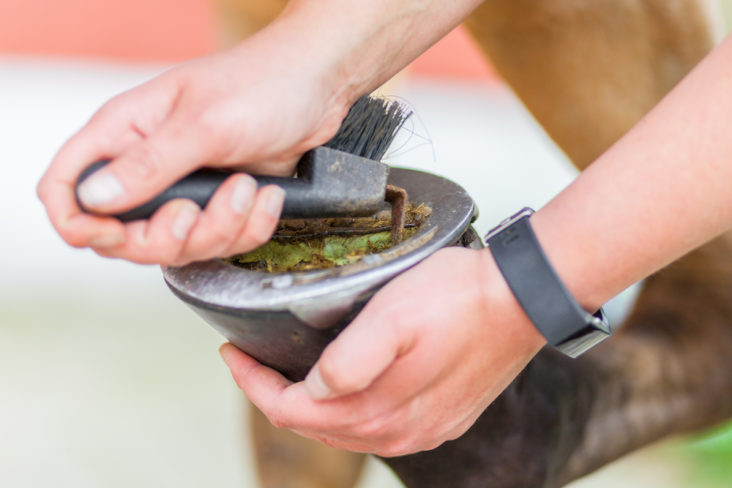As we grow up we are always taught to look after our feet, to keep them dry, to keep nails trimmed and to wear shoes that fit correctly. The same level of care should be taken with pets in the home and for animals on the farm, to ensure that they do not become lame or uncomfortable as they move around fields or paddocks.
Hooves work to protect the feet against foreign objects and infection, but they need help from us along the way. Here are some simple tips that you can follow in order to keep your animals hooves in good condition, which will be better in the long run, as once a hoof is damaged it can be a long and costly road back to recovery.

Hoof Care for Horses
Keeping a horse is a big commitment and this is true of looking after their feet too.
- Pick out their hooves once a day with a hoof pick, such as a Cottage Craft Hoof Pick and Brush.
- Practise good hygiene in the stable - keep it dry and clean to avoid contamination that can affect your horse’s hooves.
- Apply hoof oils on a daily basis, along with creams and dressings that can help to keep hooves tough. Try an Effol Yellow Hoof Ointment which will help to keep their natural elasticity.
- Check horse shoes regularly for wear and tear. If there is an issue deal with it straight away, as leaving it could cause bigger problems later on.
- Organise a farrier to visit around every 4-6 weeks - it is best to spend the money now rather than have bigger bills later on.
- Regular exercise will help to improve your horse’s circulation, which will help the hooves and feet to stay healthy.
- Keep a lookout for bruised soles, thrush and other infections, treating issues immediately so that the symptoms do not worsen and potentially spread to other horses.
Other Animals with Hooves
All animals with hooves should be cared for in the same way, in order to prevent injury or infection.
- Don’t neglect hoof care, as could lead to abscesses, cracks and even lameness.
- Beware that in wet conditions the hoof can become softened - this can bring about serious bacterial infections. Nettex Lameless Derma Phenox Spray will help to combat this bacteria.
- If an animal has damaged or sore hooves, they will not walk to areas of better grazing and will suffer from malnutrition.
- Cows require hooves to be trimmed, but don’t overdo it. Dairy cows, for example, need trimming just once a year.
- Avoid rocky pastures wherever possible, as this may break or damage hooves.
- If you notice an animal walking with a limp or can smell a strong odour, this could be a sign of a damaged hoof meaning it is time to involve a vet before the condition worsens.
- As with horses, remove any dead tissue so that the foot can repair itself with fresh skin.
Keeping on top of hoof care should be a part of your regular daily routine. Dealing with any problems straight away is important, to ensure that your animal has a long and healthy life.
Sources
https://www.viovet.co.uk/knowledgebase/a177-A-Guide-To-Horse-Hoof-Care
https://www.bluecross.org.uk/pet-advice/essential-hoof-care-horses
https://www.farmersweekly.co.za/farm-basics/how-to-livestock/hoof-management-guidelines/